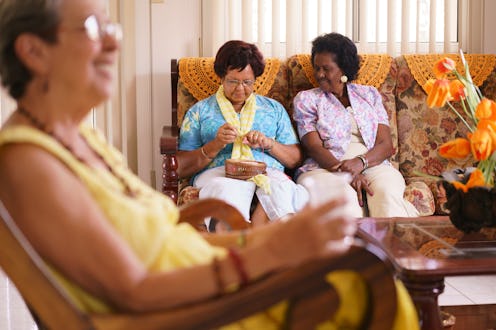
Feminism looks extremely different now than it did 50 or 100 years ago, sometimes to the point of being almost unrecognizable. Nevertheless, there are plenty of things we can learn from our grandmothers' generation — both their triumphs and their mistakes — that are applicable to gender equality today.
Not all of us agree with our older relatives about social issues and politics, so it's understandable that some of us would rather keep conversations with our grandparents centered on how great the bread they baked was or what memories they have of our childhoods. But if you're lucky enough to have grandparents who are still alive, it may be worthwhile to ask them about what life was like for them growing up. The "when I was your age, I had to walk 10 miles in the snow to school" cliche doesn't do the justice to the fact that our grandparents actually experienced firsthand many of the things we've only learned about in history class.
Most Millennials' grandmothers were alive during parts of the first or second-wave feminist movements, so their generation knows a lot of things about women's fight for equality that we can benefit from. Therefore, here are some lessons that feminists can learn from their grandmothers' generation.
1. Our Rights Should Not Be Taken For Granted
For much of their lives, our grandmothers could not hold credit cards under their own names, report rape at the hands of their husbands, or legally get abortions. Ask your grandmother to tell you what this was like (or read this collection of stories from women denied these rights). Hillary Clinton can tell you about the credit card bit. Knowing this can give us a greater appreciation for the privileges we enjoy today and also make us fight harder to keep them.
2. Our Ability To Work Is A Gift
It's easy to complain about hating your job, but many of our grandmothers either were forced to be stay-home parents and felt restless there or fought hard for their ability to both work and be mothers. Freud defined mental health as the ability to love and to work, and by that definition, many women were deprived of their mental health.
Before Betty Friedan's The Feminine Mystique brought attention to this problem in 1963, many women felt "crazy" for not feeling fulfilled as housewives. Granted, other women's experiences were not captured in this book because economically, they had no choice but to work. But the idea that women had the right to choose to work as a means of fulfillment, not just out of necessity, was huge. The struggle our grandmothers underwent to work outside the home reminds us that our ability to follow our passions is a blessing that should not be wasted on jobs we don't love.
3. We Don't Need Men To Define Us
In 1921, American women formed the Lucy Stone League to advocate for their right to keep their own last names. Even though many women did keep their maiden names during that time and earlier, they weren't allowed to use them for legal procedures like getting a passport or voting.
This was all part of a larger struggle for women not to be defined by their fathers, husbands, or any other men and to challenge the notion that their worth lay in who they married. While we may not feel as much pressure to get married and we're allowed to change or keep our names when we get married, the lesson not to let men define us is still applicable to every woman who has even doubted her self worth after a guy dumped her.
4. Intersectionality Is Important
Many women of color can attest to the exclusion of non-white women from the first- and second-wave feminist movements. This still happens now, during the third wave and beyond, unfortunately. The alienation that women of color felt from early feminists should teach us not to hold all-white panels and protests or only care about issues disproportionately affecting white women.
Our grandmothers' generation also teaches us how instrumental women of color have been to the feminist movement. As Gloria Steinem has pointed out, many of the most influential early feminists have been black women. She cites Flo Kennedy and Dorothy Pitman Hughes as influential to her, though there are many others. In fact, many women civil rights activists, including Coretta Scott King, were also women's rights activists.
5. We Are More Than Society Says We Can Be
During our grandmothers' generation, women were taught the best thing they could be was a secretary and that they weren't smart enough to go to college, capable enough to run for office, or strong enough to play sports. Their generation and many generations since have proven these supposedly common-sense beliefs wrong.
Which makes you wonder: What limitations placed on women now will we one day look back on and think, "Remember when we were told we couldn't do that? We sure proved them wrong."